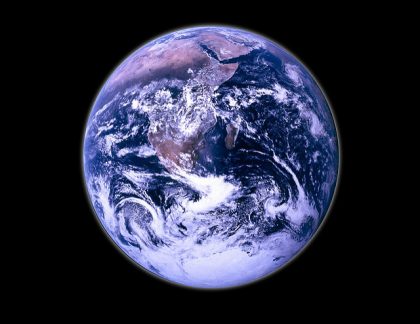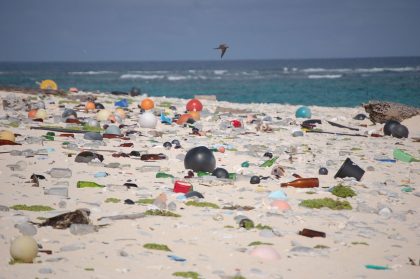Most of us lead a charmed life. We have luxuries and conveniences that our forebears could scarcely dream of. Not only do we have unlimited access to light, warmth and fresh, clean drinking water, the miracle of broadband internet has given us access to all the knowledge and entertainment that we could ever dream of. As such, we’ve become addicted to convenience. If we want to watch an episode of The Simpsons on a moving train and for whatever reason we can’t we become disgruntled. If our broadband should fail us or our lights should go out, we act as though we’ve been suddenly and completely deprived of oxygen. We’ve become addicted to convenience. With so many luxurious and convenient time and effort saving products on the market we have become accustomed to not only accept convenience as our God given right, but not to even stop to think of the ethical cost behind it.

As such, we have become reliant on many products that, whether we’re aware of it or not, are slowly killing the planet. Whether you’re a person of faith or not, we all want to ensure a better planet for future generations. Indeed, no less a personage than the late great Stephen Hawking theorized that unless we change our ways we could well render the Earth completely uninhabitable within a century.
God gave us the planet… Are we showing our appreciation?
Stop me if you’ve heard this quote from Genesis before;
“Be fruitful and increase in number, fill the earth and subdue it. Rule over the fish of the sea and the birds of the air and over every living creature that moves on the ground.”
A lot of people have a worrying misinterpretation of this passage. I doubt that when we’re told to subdue the Earth that we’re encouraged to poison it, raze it and bend it completely to our will, more that we should try and find an equilibrium while protecting ourselves from its harsher ravages like extremes of weather, wild animals etc. Essentially, this passage reads to me as an instruction to look after the planet. After all, if you give your child a brand new toy, you don’t expect them to rip it’s head off, chew it’s legs off and try to flush it down the toilet, do you?
However you interpret these words, we know that God expects us to be dutiful custodians of our planet… And so far we’re doing a pretty poor job of it. But every home all over the world has the potential to enact real change. The first step towards that change is ridding ourselves of the products which, however much we love them (or depend on them), are slowly destroying our planet…
Let’s clean up our act while we clean up our homes
Everyone wants a beautiful, clean and tidy home that wows their guests and creates a great first impression to new visitors. But very often the products that we use to attain it come with a surprising environmental and ethical price tag. Many cleaning products on the market contain harmful and volatile chemicals like sulfates, nitrogen and ammonia which can have a harmful effect on the local marine plant life, fish and animals.
Fear not, however, because you can still have a beautiful and immaculately clean home without a worrying ethical price tag. There are many natural cleaners available from ethical brands that eschew harmful chemicals for natural, sustainable and biodegradable ingredients. If you’re feeling inventive, you can even make your own from scratch. You’d be amazed at what you can accomplish with a little baking soda, lemon juice, water and white vinegar!

Plastics are getting drastic
We as a society are enormously over reliant on plastics, particularly single use plastics. The trouble with many plastics is that they cannot be recycled and even the ones which can very often aren’t. Think of all those recyclable plastic soda and water bottles just sitting there in all those sidewalk garbage cans. Once they go into landfill, they can create colossal problems for our oceans. In the US alone, 50 billion plastic bottles were used last only year. Only 24% of these were recycled. That’s 38 billion plastic bottles a year thrown into landfill waste. By 2020 it’s estimated that half a trillion plastic bottles will go into circulation and by 2050 marine biologists project that unless we mend our ways there will be more plastics in our oceans than fish. Y’see, unlike natural materials like wood, paper or card, plastics do not biodegrade. Every single toothbrush you’ve ever owned is still out there, somewhere. Plastics are in pretty much everything from the packaging of the food we buy to the beauty products that we use every day. While harmful microbeads have thankfully been banned from our cosmetics we’re still a long way from addressing how our dependence on the convenience plastic provides is leading to a decidedly inconvenient future for our oceans and the animals, plants and indigenous peoples that are sustained by them.
Over time, as they come into contact with our waters, plastics leach harmful chemical compounds into our oceans while they are also swallowed by marine birds, mammals and fish with inevitably painful and fatal consequences.
Try to reduce the amount of prepackaged foods that you buy and get loose veggies, fruits, cereals, pasta, rice etc. wherever you can. Take your own reusable drinking straws and bamboo knife and fork whenever you go out. When you rethink your habits, living without plastics, especially single use plastics, is surprisingly easy.
Meat, right and worthy?
Every family should eat a balanced diet, but they should also think of the ethical cost of the food they put on their plate. Studies show that quitting, or at least cutting down on our consumption of meat and dairy is the single best thing that we can do for our planet. Not only is our western addiction to animal foods ruinous to our health, it’s also slowly killing our planet. In fact, animal agriculture is responsible for more airborne pollutants than the entire transportation industry.
If we want to make a difference on this beautiful, fragile little planet of ours, we need to seriously rethink our dependence on these products.
